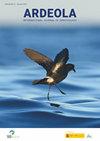没有一个鸟类数据库是完美的:公民科学和专业数据集包含不同和互补的生物多样性信息
IF 1.2
4区 生物学
Q2 ORNITHOLOGY
引用次数: 8
摘要
总结。公民科学已经成为收集生物多样性大数据的有力工具。然而,人们对这些新数据集的潜在偏差提出了担忧。我们的目的是测试公民科学鸟类数据库是否比专业科学数据库有更多的偏见。我们的假设是:1)公民科学数据库将有更多关于“容易发现”的物种的数据,这些物种分布广泛,体型较大;而专业的数据库将会有更多的濒危物种和特别值得研究的物种。我们分析了六个西班牙鸟类数据库:三个专业数据库,两个公民科学数据库和一个混合数据库。我们的研究结果表明,一般来说,与专业数据库相比,公民科学数据库中的事件可以更好地用所研究的变量来解释,但是当单独分析时,没有发现明显的差异。公民科学和专业数据库都包含关于生物多样性的宝贵信息,但每个数据库都有其特定的历史,其存储的数据是多年来以不同的目标、采样方法和采样努力进行实地采样的结果。因此,原始观察不应直接用作鸟类分布或丰度的理想调查。我们需要发现这些偏见,并开发新的方法来适当地整合广泛而多样的生物多样性数据,这些数据可以随时用于研究。-Galván, S., Barrientos, R. & Varela, S.(2022)。没有一个鸟类数据库是完美的:公民科学和专业数据集包含不同的和互补的生物多样性信息。农业学报,69:97-114。本文章由计算机程序翻译,如有差异,请以英文原文为准。
No Bird Database is Perfect: Citizen Science and Professional Datasets Contain Different and Complementary Biodiversity Information
Summary. Citizen science has become a powerful tool for collecting big data on biodiversity. However, concerns have been raised about potential biases in these new datasets. We aimed to test whether citizen science bird databases have more biases than professional scientific databases. Our hypotheses were 1) citizen science databases will have more data on “easy to spot” species, that are widely distributed and have large body sizes; whereas 2) professional databases will have more endangered species and species of special interest for research. We analysed six Spanish bird databases: three professional, two citizen science and one mixed database. Our results show that, in general, occurrences in citizen science databases are better explained by the studied variables than professional databases, but no clear differences were found when analysed individually. Both citizen science and professional databases contain invaluable information on biodiversity but every database comes with a particular history and its stored data is the result of years of field sampling with heterogeneous goals, sampling methods and sampling effort. Consequently, raw observations should not be used directly as an ideal survey of the distribution or abundance of birds. We need to uncover these biases and develop new methods to properly incorporate the extensive and heterogeneous biodiversity data that is readily available to research.—Galván, S., Barrientos, R. & Varela, S. (2022). No bird database is perfect: citizen science and professional datasets contain different and complementary biodiversity information. Ardeola, 69: 97-114.
求助全文
通过发布文献求助,成功后即可免费获取论文全文。
去求助
来源期刊
CiteScore
2.30
自引率
6.20%
发文量
16
审稿时长
>12 weeks
期刊介绍:
Ardeola: International Journal of Ornithology is the scientific journal of SEO/BirdLife, the Spanish Ornithological Society. The journal had a regional focus when it was first published, in 1954. Since then, and particular during the past two decades, the journal has expanded its thematic and geographical scope. It is now a fully international forum for research on all aspects of ornithology. We thus welcome studies within the fields of basic biology, ecology, behaviour, conservation and biogeography, especially those arising from hypothesis-based research. Although we have a long publication history of Mediterranean and Neotropical studies, we accept papers on investigations worldwide.
Each volume of Ardeola has two parts, published annually in January and July. The main body of each issue comprises full-length original articles (Papersand Review articles) and shorter notes on methodology or stimulating findings (Short Communications). The publication language is English, with summaries, figure legends and table captions also in Spanish. Ardeolaalso publishes critical Book Reviewsand PhD-Dissertation Summaries; summarising ornithological theses defended in Spain. Finally there are two Spanish-language sections, Ornithological News; summarising significant recent observations of birds in Spain, and Observations of Rare Birds in Spain, the annual reports of the Spanish Rarities Committee.

 求助内容:
求助内容: 应助结果提醒方式:
应助结果提醒方式:


